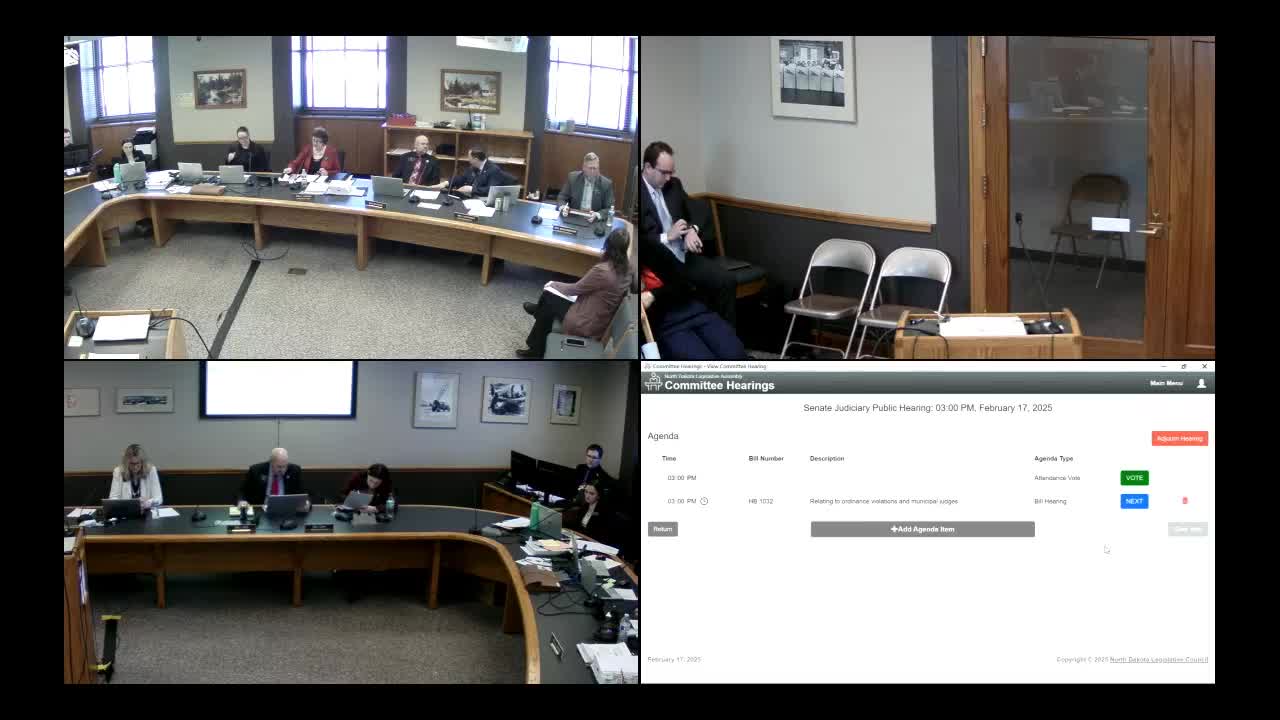Senate Judiciary committee hears bill to rewrite municipal courts statute; debate centers on courts of record and lawyer requirement
Get AI-powered insights, summaries, and transcripts
Subscribe
Summary
The Senate Judiciary Committee heard testimony on House Bill 1032, a comprehensive rewrite of the law governing municipal courts (new chapter 40‑18.1). Proponents said the bill modernizes and clarifies procedures for small-city courts; opponents urged stronger requirements for courts of record, licensed judges and timely case reporting.
The Senate Judiciary Committee opened a hearing on House Bill 1032, a legislative rewrite to create a new chapter 40‑18.1 governing municipal courts and to update procedures for ordinance violations and municipal judges.
Sarah Behrens, a staff attorney with the State Court Administrator's Office, told the committee the bill packages a multi‑year study into clearer procedures, oversight and duties for municipal courts. "Much of the bill is the same or substantially similar to current law, but it has been updated and reorganized," Behrens said, and she urged a "due pass."
The bill would rename and reorganize current chapter 40‑18 into chapter 40‑18.1, consolidate jurisdictional rules, and add provisions on fitness to proceed, criminal responsibility, transfer and appeal procedures, clerk duties, prosecutor presence and the mechanics for abolishing municipal courts. Behrens said Section 1 gives district courts explicit authority to hear municipal ordinance cases for cities with fewer than 5,000 residents and for cities that enter into specified agreements. Section 3 creates the new chapter and includes requirements for public posting of court schedules, options for joint or resource‑sharing municipal courts, and a clearer procedure for filling judicial vacancies.
Proponents from local stakeholders described the bill as the product of a multi‑party study. Stephanie Ingebretsen of the North Dakota League of Cities said the change will permit district‑court jurisdiction for ordinance violations in cities under 5,000 that do not maintain a municipal court, avoiding the need for many small cities to create standalone courts. She also highlighted a new requirement that a city provide a licensed prosecutor for all contested hearings involving a Class B misdemeanor.
Municipal judges testified on operational impacts. West Fargo municipal Judge Trent Marcus said many municipal judges and courts are part‑time and lightly staffed; he warned that adding court‑of‑record requirements would impose substantial staffing and transcription costs on small cities. "If you add that court of record requirement, that would require us to go back to the city and hire more staff," Marcus said, describing recent clerk turnover that forced a cancellation of court.
Opponents urged stronger reforms. Jackie Hall, executive director of the North Dakota Association for Justice, said the bill as written leaves municipal courts non‑courts of record and permits non‑law‑trained judges in many jurisdictions. "If that individual that's actually making the decision is not a licensed attorney, is that fair to both sides?" Hall asked, and she recommended either making municipal courts courts of record or requiring licensed judges, with grandfathering for current judges.
Committee members questioned details of several provisions. Senators asked why fitness to proceed requires transfer to district court, while the criminal‑responsibility process is framed as permissive in some instances. Behrens and municipal judges explained that constitutional and procedural differences underlie the different language: fitness to proceed often precludes prosecution until fitness is restored, whereas criminal responsibility (formerly the insanity defense) can be asserted later and sometimes handled outside court through private examinations.
Law‑training data was presented: courts and judges vary in legal training — committee testimony cited roughly 54 municipal judges across about 73 courts, with 21 judges described as law‑trained (about 39 percent) and additional law‑trained alternates. Senators also asked about use of Odyssey, the statewide case management system; the State Court Administrator's Office said 15 municipal courts currently use Odyssey and that the system is typically required for courts handling about 900 or more cases per year. Smaller courts often lack consistent staff and turnover has hampered training and reliable use of Odyssey in some places.
Other bill provisions discussed include: (1) a 28‑day deadline for a defendant to request transfer of a municipal case to district court (the judge must grant a timely request); (2) procedures for deposit of fines and forfeitures in a city's general fund when cases transfer to district court; (3) updated sentencing cross‑references and removal of antiquated penalties; (4) rules for docketing civil judgments for unpaid fines and fees; and (5) separate procedures allowing small cities to abolish municipal courts by resolution with at least 90 days' notice, while larger courts may abolish only by agreement with county and judicial officials and a minimum 180‑day transition.
No formal committee action or vote occurred; proponents asked for a due‑pass recommendation but the committee deferred action to a later meeting. Chair Charles Larson closed the hearing and said the committee would reconvene the following morning. The bill will return to the committee for further consideration.
The hearing record shows a mixture of agreement and disagreement among stakeholders: proponents and municipal judges generally favored the clearer statutory structure and flexibility for small cities, while the Association for Justice and some senators urged stricter requirements for record keeping, licensed judges and timely reporting into statewide systems.
Looking ahead, committee members indicated they want additional follow‑up on case volumes, Odyssey participation, and the costs associated with any move to courts of record or universal Odyssey reporting.
